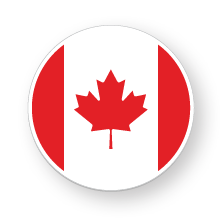 Canada
Canada
The economy continued to struggle through the first half of the year, eking out only tepid growth while the employment picture continued to deteriorate. Canadian households are showing increasing signs of financial stress, as interest rate increases have led to sharply higher borrowing costs, especially for homeowners, and as higher prices from the surge in inflation over the last few years take their toll on finances and spending power. In light of falling inflation and anemic growth, the Bank of Canada cut their trend-setting overnight rate by 0.25%, helping lift some of the gloom. Canadian stocks have continued their upward grind, albeit with only modest gains year-to-date for the S&P/TSX Composite, as investors struggled to assess the path forward for corporate earnings for 2024 and beyond.
 United States
United States
The world’s largest economy continues to overcome the headwinds of subdued global growth and high interest rates, defying expectations to post increasingly moderating but nonetheless impressive growth through the first half of the year. While inflation has remained sticky, prompting the U.S. Federal Reserve (Fed) to remain on the sidelines so far this year, more recent numbers are indicating that it may be finally inching towards the Fed’s target band of 1% to 3%. Despite the moderation, with a presidential election looming in November and the Fed’s history of not wanting to be a factor in it, it remains increasingly likely that the central bank’s hands are tied until November’s rate-setting meeting to begin bringing rates lower. In the meantime, U.S. equity markets continued to scale new highs through the first half of the year, driven largely by U.S. mega-tech stocks.
 Europe
Europe
After a challenging 2023, Europe is growing again, if only tepidly, buoyed by consumer spending, job growth and tourism. The region has at long last seen a significant and sustained lessening of price pressures, after suffering multi-decade highs in inflation through 2022 and 2023. The European Central Bank delivered what is expected to be the first of several cuts to its trend-setting deposit rate, raising hopes that the region will achieve its projected GDP growth of 1% for 2024. However, an alarming increase in political gains by far-right parties in recent regional elections has raised worries amongst centrist governments, with France’s President even deciding to call snap elections to challenge the surge. The political uncertainty has caused the region’s bonds yields to spike, increasing worries that borrowing rates will remain higher for longer than expected.
 Emerging Markets
Emerging Markets
While EM nations have experienced some marginal relief to their macroeconomic conditions in 20024 as the outlook continues to improve regarding U.S. interest rates and yields, the revised view of “higher for longer” continues to weigh on these countries. Higher U.S. rates mean little wriggle room for EM countries to lower their own interest rates, as they risk further devaluation against the mighty “greenback”. And, with much of EM debt priced in U.S. dollars, debt markets have been battered. China continues to experience lower-than-trend growth, as it struggles with increasingly restrictive government policies and a ravaged real estate market. Despite these challenges, solid growth is expected from EM leaders Mexico, India and Brazil, while Russia, mired in a costly war with Ukraine, is expected to struggle for the remainder of 2024 and beyond.
Past performance is not indicative of future results. Counsellor Quarterly has been prepared for use by RBC Phillips, Hager & North Investment Counsel Inc. (RBC PH&N IC). The information in this document is based on data that we believe is accurate, but we do not represent that it is accurate or complete and it should not be relied upon as such. Persons or publications quoted do not necessarily represent the corporate opinion of RBC PH&N IC. This information is not investment advice and should only be used in conjunction with a discussion with your RBC PH&N IC Investment Counsellor. This will ensure that your own circumstances have been considered properly and that action is taken on the latest information available. Neither RBC PH&N IC, nor any of its affiliates, nor any other person accepts any liability whatsoever for any direct or consequential loss arising from any use of this report or the information contained herein. This document is for information purposes only and should not be construed as offering tax or legal advice. Individuals should consult with qualified tax and legal advisors before taking any action based upon the information contained in this document. Some of the products or services mentioned may not be available from RBC PH&N IC; however, they may be offered through RBC partners. Contact your Investment Counsellor if you would like a referral to one of our RBC partners that offers the products or services discussed. RBC PH&N IC, RBC Global Asset Management Inc., RBC Private Counsel (USA) Inc., Royal Trust Corporation of Canada, The Royal Trust Company, RBC Dominion Securities Inc. and Royal Bank of Canada are all separate corporate entities that are affiliated. Members of the RBC Wealth Management Services Team are employees of RBC Dominion Securities Inc. RBC PH&N IC is a member company of RBC Wealth Management, a business segment of Royal Bank of Canada. ® / ™ Trademark(s) of Royal Bank of Canada. RBC, RBC Wealth Management and RBC Dominion Securities are registered trademarks of Royal Bank of Canada. Used under licence. © RBC Phillips, Hager & North Investment Counsel Inc. 2024. All rights reserved.
